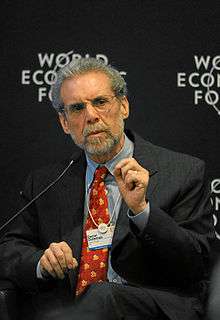Daniel Goleman
| Daniel Goleman | |
|---|---|
 Goleman in 2011 | |
| Born |
March 7, 1946 Stockton, California, U.S. |
| Occupation | Writer |
| Alma mater | Amherst College, Harvard University |
| Spouse | Tara Bennett-Goleman |
| Children | 2 |
| Website | |
|
DanielGoleman | |
Daniel Goleman (born March 7, 1946) is an author, psychologist, and science journalist. For twelve years, he wrote for The New York Times, reporting on the brain and behavioral sciences. His 1995 book, Emotional Intelligence was on The New York Times bestseller list for a year-and-a-half, and a best-seller in many countries, in print worldwide in 40 languages. Apart from his books on emotional intelligence, Goleman has written books on topics including self-deception, creativity, transparency, meditation, social and emotional learning, ecoliteracy and the ecological crisis, and the Dalai Lama’s vision for the future.
Biography
Goleman was born in Stockton, California, the son of freethinking college professors. He received a scholarship from the Alfred P. Sloan Foundation to attend Amherst College. The Amherst Independent Scholar program allowed him to transfer for his junior year to the University of California at Berkeley. He returned to Amherst where he graduated magna cum laude. He then received a scholarship from the Ford Foundation to attend Harvard University where he received his PhD studying under David C. McClelland.
He studied in India using a pre-doctoral fellowship from Harvard and a post-doctoral grant from the Social Science Research Council. While in India, he spent time with spiritual teacher Neem Karoli Baba, who was also the guru to Ram Dass, Krishna Das (Singer) and Larry Brilliant.[1] He wrote his first book based on travel in India and Sri Lanka.
Goleman then returned as a visiting lecturer to Harvard, where during the 1970s his course on the psychology of consciousness was popular. McClelland recommended him for a job at Psychology Today from which he was recruited by The New York Times in 1984.[2]
Goleman co-founded the Collaborative for Academic, Social, and Emotional Learning at Yale University's Child Studies Center which then moved to the University of Illinois at Chicago. Currently he co-directs the Consortium for Research on Emotional Intelligence in Organizations at Rutgers University. He sits on the board of the Mind & Life Institute.[2]
Career
Goleman authored the internationally best-selling book, Emotional Intelligence (1995, Bantam Books), that spent more than one-and-a-half years on The New York Times bestseller list. Goleman developed the argument that non-cognitive skills can matter as much as I.Q. for workplace success in Working with Emotional Intelligence (1998, Bantam Books), and for leadership effectiveness in Primal Leadership (2001, Harvard Business School Press). Goleman's most recent best-seller is Focus: The Hidden Driver of Excellence (Harper, 2013).
In his first book, The Varieties of Meditative Experience (1977) (republished in 1988 as The Meditative Mind) Goleman describes almost a dozen different meditation systems. He wrote that "the need for the meditator to retrain his attention, whether through concentration or mindfulness, is the single invariant ingredient in the recipe for altering consciousness of every meditation system".[3]
Awards
Goleman has received many awards, including:
- Career Achievement award for journalism from the American Psychological Association
- Fellow of the American Association for the Advancement of Science in recognition of his efforts to communicate the behavioral sciences to the public
- Bradford Washburn Award for science writing
- Klingenstein Educational Leadership Award
- Harvard Business Review McKinsey Award winner for his December 2013 article “The Focused Leader”
Publishing history
Books
- 1977: The Varieties of the Meditative Experience, Irvington Publishers. ISBN 0-470-99191-7. Later republished as The Meditative Mind: The Varieties of Meditative Experience, Tarcher/Penguin. ISBN 978-0-87477-833-5.
- 1985: Vital Lies, Simple Truths: The Psychology of Self Deception, Simon & Schuster. ISBN 978-0-7475-3413-6
- 1995: Emotional Intelligence: Why It Can Matter More Than IQ, Bantam Books. ISBN 978-0-553-38371-3
- 1997: Healing Emotions: Conversations with the Dalai Lama on Mindfulness, Emotions, and Health, Shambhala. ISBN 978-1-59030-010-7
- 1998: Working with Emotional Intelligence, Bantam Books. ISBN 978-0-553-37858-0
- 2001: Primal Leadership: The Hidden Driver of Great Performance, Co-authors: Boyatzis, Richard; McKee, Annie. Harvard Business School Press. ISBN 978-1-57851-486-1
- 2001: The Emotionally Intelligent Workplace, (edited with Cary Cherniss) Jossey-Bass. ISBN 978-0-7879-5690-5
- 2003: Destructive Emotions: A Scientific Dialogue with the Dalai Lama, Bantam Books. ISBN 978-0553801712. 2004 Pbk: ISBN 978-0-553-38105-4
- 2006: Social Intelligence: The New Science of Social Relationships, Bantam Books. ISBN 978-0-553-80352-5
- 2009: Ecological Intelligence: How Knowing the Hidden Impacts of What We Buy Can Change Everything, Broadway Business. ISBN 0-385-52782-9, ISBN 978-0-385-52782-8
- 2011: The Brain and Emotional Intelligence: New Insights, More Than Sound. ISBN 978-1-93444-115-2
- 2011: Leadership: The Power of Emotional Intelligence – Selected Writings, More Than Sound. ISBN 978-193444-117-6
- 2013: Focus: The Hidden Driver of Excellence, Harper. ISBN 0062114867
- 2014: The Triple Focus: A New Approach to Education, with Peter Senge, More Than Sound. ASIN B00MBOZIM8
- 2015: A Force for Good: The Dalai Lama's Vision for Our World, Bantam Books. ISBN 9780553394894
See also
References
External links
| Wikiquote has quotations related to: Daniel Goleman |
- Official website
- Daniel Goleman at the Internet Movie Database
- Wired to Connect, Dialogues on Social Intelligence
- Daniel Goleman at TED

- The Social Brain: Daniel Goleman interviewed on Humankind Public Radio
- CSPAN BookTV – video of Daniel Goleman discussing Ecological Intelligence: How Knowing the Hidden Impacts of What We Buy Can Change Everything on YouTube
- Daniel Goleman: Using Auto Suggestion to Relax
- Key Ingredients to Build Rapport on YouTube